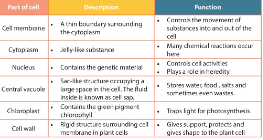What are the parts of a cell along with their descriptions and functions?

Understand the Problem
The question involves identifying various parts of a cell along with their descriptions and functions, which seems to be focused on cell biology.
Answer
Cell membrane, cytoplasm, nucleus, central vacuole, chloroplasts, cell wall.
The main parts of a cell include the cell membrane, cytoplasm, nucleus, central vacuole, chloroplasts, and cell wall. Each part has specific functions such as controlling substance movement, housing genetic material, storing substances, and facilitating photosynthesis.
Answer for screen readers
The main parts of a cell include the cell membrane, cytoplasm, nucleus, central vacuole, chloroplasts, and cell wall. Each part has specific functions such as controlling substance movement, housing genetic material, storing substances, and facilitating photosynthesis.
More Information
Each cell part plays a critical role in maintaining the cell's functionality. For example, the nucleus stores DNA, controlling cellular activities, while chloroplasts enable photosynthesis in plant cells.
Tips
A common mistake is confusing plant and animal cell structures; remember that chloroplasts and cell walls are not found in animal cells.
Sources
- Cell parts and functions (article) | Khan Academy - khanacademy.org
- Cell Organelles - Types, Structure and their Functions - BYJU'S - byjus.com
- Parts of the Cell | Ask A Biologist - Arizona State University - askabiologist.asu.edu
AI-generated content may contain errors. Please verify critical information